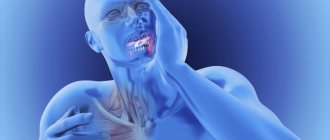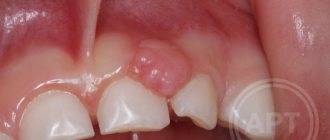How does a “heavy” head feel?
It’s not just a headache that can interfere with normal perception of the colors of the world around you and living in peace. Sometimes a tedious heaviness in the head is perceived worse than a migraine attack. After all, a migraine will go away after a certain period of time, and the feeling of a burden in the head can torment a person for a very long time.
How do patients describe their feelings?
- In the morning, my head pulls towards the pillow.
- There is a feeling that the skull has been filled with stones.
- It was as if blood from the whole body had collected in the skull.
- Metal disks move heavily in the brain.
- Difficulty concentrating.
- Information is not perceived adequately.
- I want to put my head in my arms and sleep, sleep, sleep.
- Nausea creeps up my throat.
- Lethargy falls on the body, it is difficult to even raise an arm.
Often the headache does not hurt, but it is heavy and cottony. Unpleasant sensations can occur in the morning and do not disappear even after a long sleep.
Reasons for the appearance of “fog, ambiguity” in the head
Do you always feel a little drunk or drugged? This condition makes it difficult to concentrate, perform usual work, and may be accompanied by recurring headaches. To get rid of discomfort, it is necessary to establish the cause of its occurrence and try to eliminate it.
As stated earlier, the causes of brain fog may not always be due to health problems. Thus, when there are disruptions in the hormonal system, fog in the head is almost always observed. During pregnancy, a woman is often accompanied by this condition, as well as irritability and forgetfulness. The same symptoms may occur during menopause.
Diseases accompanied by heaviness in the head
Heaviness in the head may be a sign of brain damage. Also, unpleasant sensations, a feeling of lethargy and weakness indicate that a person is developing a serious illness.
Vegetative-vascular dystonia
With this disease, any unusual load can cause discomfort. The tone of brain vessels is disrupted, the outflow of venous blood is hampered, and the supply of oxygen to brain cells deteriorates. The result is a feeling of overcrowding in the skull.
A person suffering from vegetative-vascular dystonia often has panic attacks that worsen the general condition. Depressive thoughts arise that literally make your head explode. If there is no opportunity to rest and relax, the feeling of heaviness is accompanied by a headache: bursting, aching, throbbing.
Meniere's disease
Damage to the vestibular system can also cause a person to have a feeling of heaviness in the head. Meniere's disease is an inflammation of the inner ear, labyrinthine dysfunction develops, in which an excess amount of fluid is released. Liquid accumulates in the labyrinth, pressing on the nerve endings. Symptoms of the disease:
- Ear noise, feeling of fullness in the ears.
- Constant dizziness.
- Loss of balance when walking.
- Nausea.
- Hearing loss.
Due to the fact that the vestibular system sends distorted signals to the brain, a person has a feeling of a cotton head. It is difficult for the patient to stand up; when bending over, he is pulled forward.
Osteochondrosis
If the cervical spine is affected by osteochondrosis, then the person’s blood supply to the brain is disrupted. Most often the vertebral artery is compressed. This can provoke an increase in intracranial pressure and lead to oxygen starvation of the brain. A gradual deterioration in blood flow causes the following symptoms:
- Drowsiness, lethargy.
- Frequent dizziness.
- Intrusive headaches.
- Feeling of stiffness in the neck.
- Feeling of heaviness in the skull.
Those at risk include office workers, athletes, people engaged in monotonous work that requires constant repetition of the same actions. Even a nursing mother who regularly falls asleep in an uncomfortable position while breastfeeding may experience a feeling of “fullness” in her head.
Dizziness and heaviness in the head are frequent companions of teachers who spend the entire working day at the blackboard. The static and heaviness of the posture affects the pose - a raised hand with chalk, which performs monotonous movements.
Neurosis-like conditions
Chronic fatigue, constant stress, and depression can lead to a person beginning to develop neurosis. Complaints of patients suffering from neurosis:
- Feeling empty in the head.
- “Muddy” head, like jelly in the skull.
- Tightening, pressing headache.
- The feeling that a heavy hat or a cast-iron helmet was put on your head.
The patient is easily irritated and may start shouting for no apparent reason at his family or just strangers. The patient has difficulty in crowded places where there is a lot of noise and light. They cause increased discomfort; in addition to the symptoms listed above, a feeling of confusion and, at the same time, anger is added.
Sleep disturbances are noted: a person has difficulty falling asleep, often wakes up at night, and lies awake for a long time. The next morning he finds it difficult to get up, even if sleep lasted until lunch, he has a feeling of a “heavy head”, a thick “fog”.
Neoplasms
One of the main symptoms of brain cancer is a daily morning headache. In addition, patients complain of heaviness in the head and drowsiness. Pressing pain occurs in one area of the head due to the fact that the growing tumor puts pressure on the nerve endings and compresses the blood vessels. Due to poor circulation, a feeling of “fullness” and heaviness in the head appears.
The morning nature of the discomfort is due to the fact that when a person changes body position, intracranial pressure rises and cerebral edema increases. Minor physical activity increases the discomfort.
A headache can occur even at night, become stronger in the morning when waking up and subside in the evening. Dizziness, vomiting, feeling of lethargy, apathy are accompanying symptoms of the disease.
Injury
A skull fracture, concussion, neck or head injury can lead to cerebrovascular accident. Heaviness in the skull, accompanied by an annoying bursting headache, is most often a symptom of a complication that develops after a whiplash injury.
Whiplash occurs when unexpected acceleration or deceleration is applied to a person's body. Possible triggering situations:
- Falling from the stairs onto your feet.
- Car accident.
- A quick push from another person when playing football, volleyball, or hockey.
- "Shaking" the baby.
Unpleasant sensations in the head can disappear literally an hour after the injury and appear delayed: after a month, six months, a year, several years. As a result of a whiplash injury, a person experiences dysfunction of the occipital bone and its sutures. In this case, a person develops symptoms such as frequent dizziness, headaches, and heaviness in the head.
Other diseases
Experts identify several other diseases, one of the indirect symptoms of which is a feeling of “fullness” in the head. This type of discomfort does not necessarily appear as the disease progresses, but can sometimes accompany it.
These diseases include:
- Damage to the cardiovascular system.
- Injuries, ruptures of the eardrum.
- Neoplasms in the ocular apparatus, in the middle ear.
- Damage to nerve nodes.
- Migraine.
- Arterial hypertension.
- Ischemic or hemorrhagic stroke.
- Aneurysm rupture.
- Colds and infectious diseases: flu, rhinitis, otitis media.
- Prolonged lack of oxygen caused by bronchial asthma, allergic rhinitis, suffocation.
If a person constantly experiences heaviness in the head, the causes of which cannot be determined at home, you should seek help from a doctor.
Diagnostic methods
If a person has had a headache for a week, it is important to determine why the symptom is occurring. To do this, the doctor prescribes a set of examinations, depending on the results of the examination. These include:
- EEG (electroencephalography) – examination of the brain, which will identify various diseases;
- MRI is a modern, informative technique, prescribed for suspected tumors, cerebrovascular accident, stroke;
- Ultrasound of the vessels of the neck and head with the addition of a contrast agent (Dopplerography) - allows you to determine areas where blood circulation is impaired;
- laboratory blood tests are prescribed to determine inflammatory processes, the concentration of cholesterol and other substances, and disruption of the functioning of individual organs and systems.
Determining the cause of the headache is the first stage of successful treatment. The Clinical Brain Institute has high-quality equipment that allows you to visualize the full picture of the disease. All examinations can be completed in our center, including complex modern techniques.
Third-party factors that provoke heaviness in the head
Is it hard to raise your head, but you have not been diagnosed with any diseases? Perhaps the cause of discomfort is a person’s lifestyle or some external factors. Unpleasant sensations appear if:
- For a long period of time you don’t sleep enough, go to bed late and get up early.
- Sit at the computer every day, avoiding physical activity.
- Drink alcoholic beverages in large quantities.
- Spend your nights in clubs and sleep during the day.
- Use drugs.
- Use certain medications in large quantities.
Toxic damage to the body (from food, alcohol, drug poisoning) causes oxygen starvation of the brain, and is therefore accompanied by a feeling of fullness and heaviness of the skull. Allergic reactions that occur with cerebral edema can also cause discomfort. When the weather changes, a sudden cold snap, a weather-dependent person may experience heaviness in the head.
Reasons for the appearance of “fog, ambiguity” in the head
In alternative medicine there are special methods that allow you to relieve unpleasant sensations of a pressing nature. Warmed milk or a herbal decoction of chamomile or mint with the addition of a spoon of honey helps a lot: this drink will calm your nerves and relax. Valerian root tea helps relieve tension and relieve mild pressing pain.
Self-massage is recommended to relieve pain. Manipulations help relieve tension and normalize local blood flow. A warm bath with the addition of chamomile decoction and essential oils improves the condition of the skin, relieves dizziness and eliminates pain in the eyes. The use of medicinal compresses helps to get rid of bursting pain.
The above symptoms may indicate a serious illness. They are included in the symptoms of the following diseases:
- vegetative-vascular dystonia;
- anemia;
- hypoglycemia;
- vascular diseases;
- migraine;
- atherosclerosis;
- stroke;
- diseases of the spine;
- intracranial tumors;
- head injuries.
Foggy vision often occurs in people with glaucoma. This is an ophthalmopathology in which intraocular pressure increases. During an attack of glaucoma, dizziness may also occur.
Based on the pressure in the head, where the symptom is concentrated and what manifestations it is accompanied by, an experienced doctor is able to make a preliminary diagnosis. Unpleasant sensations can be caused by various pathological and physiological processes, so specific therapy is required in each case.
When experiencing a pressing headache, it is better not to take independent action, but to consult a specialist. In some cases, inadequate therapy will worsen the condition and increase the risk of complications.
Headaches plague most people, because they can provoke unpleasant syndromes in different places of the brain.
Likewise, pressing pain in the head can manifest itself in the parietal, occipital, temporal, or frontal regions, and sometimes cause a feeling of pressure on the visual organs or as if drinking from the inside.
It is often accompanied by a depressive mood, a feeling of oppression, and increased pressure in the skull. You need to begin treatment for blood pressure by identifying the factors causing pain, excluding serious diseases along the way.
How to eliminate discomfort?
Did you get up in the morning with a heavy head and can’t recover? There are several methods you can use to improve your condition.
- When a headache is added to the unpleasant sensations, it makes sense to take a pain reliever (analgesic, non-steroidal anti-inflammatory drug).
- A cool or contrast shower, which should be taken for at least 15 minutes, helps to get rid of discomfort.
- You can conduct a massage or self-massage session, gently rubbing the neck, back of the head, and temple area.
- To alleviate the condition, you can use aromatherapy: apply a couple of drops of mint, rosemary, lavender oil, tea tree oil, lemon.
- Breathing exercises effectively eliminate discomfort.
- Some yoga exercises can reduce discomfort.
- You can try to relax using self-hypnosis: sit or lie down with pleasant music and imagine yourself on the seashore, in a rustling forest, in a meadow.
Sometimes, in order to eliminate discomfort, you just need to get a good night's sleep in a dark room and normalize your working day: if your job is sedentary, periodically take breaks, exercise minutes, and regulate psychological and physical stress. It is advisable to change the pillow and mattress, choosing bedding that helps you relax while sleeping.
Treatment methods
Treatment of the ailment depends on the cause of dizziness and severity. To establish a diagnosis, in addition to general tests, an encephalogram (appropriate for various head injuries), CT, and MRI may be prescribed. If necessary, an X-ray of the brain of the head and cervical spine is performed. In some cases, it is necessary to visit an otolaryngologist, ophthalmologist or cardiologist
But, as a rule, the pain syndrome does not manifest itself so clearly, and the discomfort that arises until the main cause of its formation is determined can be eliminated with the help of analgesics and NSAIDs (Ketonal, Analgin, Paracetamol, Nimid, etc.).
If you are worried about a cloudy head, then you need to check your blood pressure. If the indicators change upward or downward, it is necessary to take the appropriate medicine (for high blood pressure - Nifedipine, Amlodipine, for low blood pressure - Gutron). Blood pressure pills are selected by a doctor, since such drugs affect the body differently.
If the deviations are insignificant, then with low pressure you can drink a cup of strong sweet tea or coffee, lemongrass or eleutherococcus tincture, with high pressure, chokeberry jam, take hawthorn tincture or drink a glass of green tea can help.
When overexerted, a person needs proper rest. You can take a sedative (Novo-passit, Sedafiton). When returning to normal work, heaviness in the head may reappear, so you need to include time for rest, physical activity and walks in the fresh air in your schedule.
It is also important not to forget about a full night’s sleep, which should be 7-8 hours
Discomfort in the head caused by cervical osteochondrosis, in the absence of a vertebral hernia, can be eliminated by increasing physical activity and performing physical procedures. Such actions are aimed at improving blood supply to the whole body.
If the head has become heavy due to neurasthenia or hypersomnia, the doctor will prescribe antidepressants (Deprim), tranquilizers (Phenobarbital) and sleeping pills (Sonnat). With positive dynamics of treatment, the patient’s ability to work is restored, night’s sleep and appetite are normalized, and the symptoms of a heavy head disappear.
Heaviness in the head caused by various reasons must be eliminated. If discomfort appears due to physiological processes, then it is better to get rid of it without using medications. After all, any drug has its side effects that have a negative impact on the human body. If gentle methods do not help, it is better to find out the cause of the symptoms from a doctor and undergo the prescribed treatment.
Features of treatment
If a patient constantly complains that he has a heavy head, the causes of discomfort are vegetative-vascular dystonia, osteochondrosis or another disease, it is best to entrust treatment to a specialist. The following therapeutic measures are carried out:
- Cerebral circulation is normalized with the help of nootropic and vasotropic drugs.
- Blood circulation is improved with the help of physiotherapy: electropheresis, phonopharesis, and magnetic therapy are used.
- Muscle spasms in cervical osteochondrosis are relieved through massage and manual therapy.
- Nervous tension is eliminated - with the help of tranquilizers, sedatives, sedatives.
- To relieve muscle spasms, muscle relaxants are taken, non-steroidal anti-inflammatory gels and ointments are applied topically.
- Allergic reactions are relieved with antihistamines.
If the cause of discomfort is the growth of a tumor, surgical intervention may be required.
In case of dysfunction of the cardiovascular system, it is necessary to strengthen blood vessels and normalize blood pressure. If the discomfort is due to a cold, the patient’s condition will return to normal after recovery.
Regular use of painkillers is required only if the heaviness in the skull is accompanied by a headache. It is advisable not to rely only on medications, but also to change eating habits and give preference to natural products. Spicy, salty, sour foods can increase discomfort, as can caffeinated drinks and chocolate.
Do you want the heaviness in your head to go away? Play sports, preferably swimming. It helps not only to get a feasible load on all muscle groups, but also to relieve accumulated negative emotions, “wash away” stress and a depressive mood. Walking in the fresh air, good sleep and the absence of nervous overload will help avoid unpleasant sensations.
Headache treatment
Treatment for a person who has had a headache for a week or more can only be determined by a doctor. Rest, a cold compress on the forehead, and a light massage of the neck and head are recommended as first aid. If the pain is severe, you can take painkillers from your home medicine cabinet. The doctor will prescribe a comprehensive treatment based on the diagnostic results, which may include the following steps:
- drug therapy - taking analgesics, anti-inflammatory drugs and antibiotics, drugs to improve nutrition and blood supply to brain cells, intervertebral cartilage;
- surgical treatment – surgery is necessary for neoplasms and advanced diseases of the cervical spine;
- additional techniques that include physiotherapy, gymnastics and therapeutic massage, swimming.
A short-term headache after a hard day at work indicates that you need to normalize your work and rest schedule. However, if it does not go away either today or on the second and third days, it is important to consult a doctor. There is a high probability of detecting chronic diseases, which can progress as they progress.










